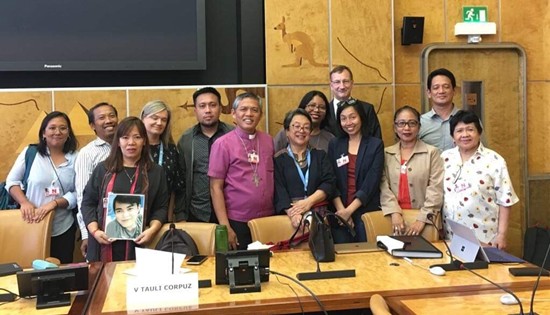
Ecuvoice
and the World Council of Churches of the Philippines with UN
Special Rapporteur Victoria Tauli-Corpuz. |
Ecuvoice calls on
the Philippine government to stop deflecting issues, cooperate with
UNHRC process
Press Release
September 18, 2019
QUEZON CITY – The
World Council of Churches (WCC) together with the Ecumenical Voice
for Peace and Human Rights in the Philippines (Ecuvoice) sponsored a
side event in Geneva, Switzerland on the Philippine human rights
situation, entitled “War vs. the Poor and Indigenous Peoples:
Duterte and Human Rights Council.”
Joining human rights
defenders, church leaders and victims of human rights abuses from
the Philippines were representatives from the missions at the UN
Human Rights Council, international NGOs and human rights
organizations from the Philippines.
The side event was held at
Palais Des Nations during the 42nd session of the UN Human Rights
Council (UNHRC). Peter Prove and Jennifer Philpot-Nissen of the
Commission of the Churches on International Affairs of the WCC
served as moderators for the event.
Large-scale murder
Among the panelists who
shared their real life stories was Marissa Lazaro, a mother whose
son was slain in 2017.
"There is a large-scale
murder of the poor,” said Marissa Lazaro.
“The police killed my son,
Christopher. He is not a drug user. He is innocent,” she added. Just
like the many other mothers who lost their loved ones from the
Duterte government’s murderous war on drugs, Marissa continues to be
strong amidst grief.
Lazaro is a member of Rise
Up for Life and Rights’ (Rise Up), a network of families of victims
of the government’s war on drugs. Her son, Christoper, was killed in
a police anti-drug operations in 2017 after authorities claimed he
refused arrest and fought back. She later found Christopher dead in
a morgue in Bulacan, with nine (9) fatal bullet wounds in his body.
“The war on drugs is a
sham,” Lazaro said. “We come to the United Nations Human Rights
Council seeking help in putting a stop to the large-scale murder of
poor people in the Philippines,” she added.
The UN HRC passed a
resolution in July 2019 on human rights violations in the
Philippines.
Attacks against indigenous people
“While urban poor
communities are experiencing bloodbath through anti-narcotics police
operations, our tribal communities endure long-term militarization,”
said Bishop Antonio Ablon, a Mindanaoan and a long-time advocate of
indigenous people’s rights.
“The Lumad people in
Mindanao have long been ravaged by the government’s
counter-insurgency war,” Ablon said. “The government brands them as
communist-terrorists and wages war against them to force them off
their ancestral land and hand it on to giant mining companies,” he
added.
Ablon, a Bishop of the
Iglesia Filipina Independiente, himself is a victim of red-tagging
and other threats on Mindanao.
Ablon called for support
for the Lumad people’s right to their ancestral land against
corporate plunder and militarization. “The violence Lumad people
suffer at the hands of military is wrong and immoral, we must take
it as our own collective responsibility to defend them and uphold
their rights,” he added.
Villification, killings of human rights defenders
Cristina Palabay,
Karapatan Secretary General and head of Ecuvoice delegation, said
that the government’s war on drugs and counter-insurgency operations
only resulted to the death of innocent civilians. “These are state
instruments of an all-out war against the poor,” Palabay said.
Palabay lamented how those
who defend human rights equally suffer vicious attacks. She noted
that at least 155 human rights defenders across the country have
been killed under the Duterte administration, including Karapatan
human rights workers.
Supporting Palabay’s claim
was Budi Tjahjono of the international NGO Franciscans
International. “There is an exponential increase in the number of
attacks against human rights defenders in the Philippines,” he
observed. Tjahjono was part of a WCC delegation to the Philippines
that met with human rights victims and defenders in August 2019.